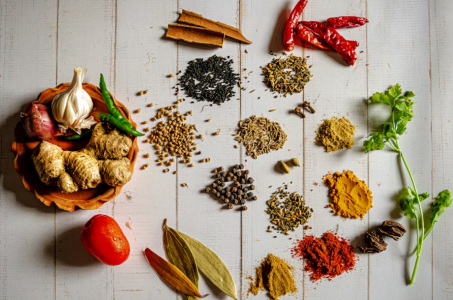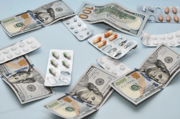Health warning: Never combine these 3 common spices with your prescriptions
- Replies 0
A pinch of spice can elevate almost any dish, adding flavor, warmth, and even health benefits.
But experts are sounding the alarm that three everyday spices lurking in your pantry may not be as harmless as they seem—especially if you’re on prescription medications.
Research has uncovered that cinnamon, turmeric, and ginger, while beloved for their taste and natural healing properties, can actually interfere with how the body processes certain drugs. And in some cases, the wrong combination could pose serious health risks.
It might sound dramatic, but the science is clear: spices that have been used for centuries in cooking and medicine can have unexpected side effects when mixed with modern pharmaceuticals.
From blood thinners to diabetes drugs, antidepressants, and antibiotics, these everyday seasonings can amplify or weaken the effects of vital medicines, leaving patients vulnerable.
Here’s what you need to know about the risks, the latest research findings, and why doctors urge caution when combining spices and prescriptions.

Compounds in cinnamon, including cinnamaldehyde, eugenol, and coumarin, can activate certain receptors in the body that speed up how drugs are metabolized. This means medications may be cleared from the bloodstream faster, reducing their effectiveness.
Experts also note that not all cinnamon is created equal. Cassia cinnamon, the variety most commonly found in supermarkets, contains higher levels of coumarin—a natural blood thinner. True Ceylon cinnamon, primarily grown in Sri Lanka, carries less coumarin and may be safer.
Still, the presence of this compound raises red flags for patients already taking anticoagulants like warfarin. Case studies have shown that cinnamon supplements, in particular, may increase bleeding risk when combined with blood-thinning drugs.
While sprinkling a little cinnamon on your morning porridge is unlikely to cause problems, supplements and high-dose use can create dangerous interactions.
Pharmacist Dipa Kamdar, writing in The Conversation, cautioned, “While this research is still in the early stages and hasn’t yet been tested in humans, it raises important questions about how cinnamon interacts with modern medicines.”
Also read: Pharmacist exposes 3 popular supplements you should never take alone – The risks are surprising!
Laboratory and animal studies suggest that turmeric affects liver enzymes responsible for metabolizing drugs, potentially altering their strength and effectiveness.
Medications most at risk include antidepressants, blood pressure drugs, chemotherapy agents, painkillers, and antibiotics. Because turmeric also has natural blood-thinning properties, it can heighten the effects of drugs like aspirin or warfarin, increasing the risk of excessive bleeding.
In some cases, it may also lower blood sugar and blood pressure, which could be dangerous when combined with medications for diabetes or hypertension.
The good news: small amounts of turmeric used in cooking are unlikely to cause complications. But high-dose supplements, often marketed as natural remedies, are where the danger lies. “As with cinnamon, these effects are most often linked to high-dose supplements, not the small amounts used in food,” Kamdar stressed.
Still, health experts warn that patients managing chronic conditions should always consult their doctor before adding turmeric supplements to their routine.
Also read: Thinking about taking supplements? Here’s what you should know first
The evidence on ginger and diabetes is mixed. Some studies suggest ginger may help lower blood sugar, but that means patients already taking anti-diabetic medication could face hypoglycemia—a potentially life-threatening drop in blood sugar levels.
While ginger is unlikely to cause harm in culinary doses, supplements and concentrated extracts carry the greatest risk.
Pharmacists urge moderation and medical guidance for patients who rely on prescription medications. “While these spices may affect how the body processes certain medications, most of these adverse effects have come about from high doses of the spices from supplements,” Kamdar explained.
Patients should speak to their doctor or pharmacist before starting any new herbal supplements, especially if they’re already on critical medications.
Source: CLS Health / TikTok
Also read: Common painkillers could be making antibiotics less effective, scientists warn
The warnings about cinnamon, turmeric, and ginger are part of a larger issue: food and drug interactions that are often overlooked. Grapefruit juice, leafy greens, and even dairy products are well-documented examples of foods that can interfere with how drugs are absorbed or metabolized.
Grapefruit, for instance, can alter the effectiveness of cholesterol-lowering statins, while vitamin K in leafy greens can blunt the effect of blood thinners.
These examples underscore the complexity of combining everyday foods and spices with pharmaceuticals. While natural remedies and dietary supplements are often marketed as safe and wholesome, they can carry risks when layered on top of prescription regimens.
Cinnamon, turmeric, and ginger remain healthy, flavorful staples when used in normal cooking amounts. But in supplement form or at high doses, they can interfere with lifesaving medications—speeding up metabolism, thinning blood, or amplifying drug effects.
The key message from experts is moderation and communication: always talk to your healthcare provider before mixing supplements with prescriptions.
Read next: This common kitchen spice could be sabotaging your medications

Could these common spices be silently interfering with your prescriptions? Share your thoughts and experiences in the comments—and let’s get a conversation going about the hidden risks in our kitchens.
But experts are sounding the alarm that three everyday spices lurking in your pantry may not be as harmless as they seem—especially if you’re on prescription medications.
Research has uncovered that cinnamon, turmeric, and ginger, while beloved for their taste and natural healing properties, can actually interfere with how the body processes certain drugs. And in some cases, the wrong combination could pose serious health risks.
It might sound dramatic, but the science is clear: spices that have been used for centuries in cooking and medicine can have unexpected side effects when mixed with modern pharmaceuticals.
From blood thinners to diabetes drugs, antidepressants, and antibiotics, these everyday seasonings can amplify or weaken the effects of vital medicines, leaving patients vulnerable.
Here’s what you need to know about the risks, the latest research findings, and why doctors urge caution when combining spices and prescriptions.

Health warning: Never combine these 3 common spices with your prescriptions. Image source: Ratul Ghosh / Unsplash
Cinnamon
Cinnamon is often thought of as a comforting spice—perfect for lattes, oatmeal, or baked goods—but recent research from the University of Mississippi has shown it may not always play nicely with medications.Compounds in cinnamon, including cinnamaldehyde, eugenol, and coumarin, can activate certain receptors in the body that speed up how drugs are metabolized. This means medications may be cleared from the bloodstream faster, reducing their effectiveness.
Experts also note that not all cinnamon is created equal. Cassia cinnamon, the variety most commonly found in supermarkets, contains higher levels of coumarin—a natural blood thinner. True Ceylon cinnamon, primarily grown in Sri Lanka, carries less coumarin and may be safer.
Still, the presence of this compound raises red flags for patients already taking anticoagulants like warfarin. Case studies have shown that cinnamon supplements, in particular, may increase bleeding risk when combined with blood-thinning drugs.
While sprinkling a little cinnamon on your morning porridge is unlikely to cause problems, supplements and high-dose use can create dangerous interactions.
Pharmacist Dipa Kamdar, writing in The Conversation, cautioned, “While this research is still in the early stages and hasn’t yet been tested in humans, it raises important questions about how cinnamon interacts with modern medicines.”
Also read: Pharmacist exposes 3 popular supplements you should never take alone – The risks are surprising!
Turmeric
Turmeric has been praised worldwide for its anti-inflammatory properties and has become a star ingredient in everything from curries to lattes. But the active compound in turmeric, curcumin, can also interfere with how the body processes certain medications.Laboratory and animal studies suggest that turmeric affects liver enzymes responsible for metabolizing drugs, potentially altering their strength and effectiveness.
Medications most at risk include antidepressants, blood pressure drugs, chemotherapy agents, painkillers, and antibiotics. Because turmeric also has natural blood-thinning properties, it can heighten the effects of drugs like aspirin or warfarin, increasing the risk of excessive bleeding.
In some cases, it may also lower blood sugar and blood pressure, which could be dangerous when combined with medications for diabetes or hypertension.
The good news: small amounts of turmeric used in cooking are unlikely to cause complications. But high-dose supplements, often marketed as natural remedies, are where the danger lies. “As with cinnamon, these effects are most often linked to high-dose supplements, not the small amounts used in food,” Kamdar stressed.
Still, health experts warn that patients managing chronic conditions should always consult their doctor before adding turmeric supplements to their routine.
Also read: Thinking about taking supplements? Here’s what you should know first
Ginger
Long celebrated for its soothing effect on nausea and its spicy kick in teas and desserts, ginger also comes with caveats. Its active compound, gingerol, can act as a mild blood thinner, making it risky for individuals on anticoagulant therapy. When combined with blood-thinning medications, ginger may raise the risk of dangerous bleeding.The evidence on ginger and diabetes is mixed. Some studies suggest ginger may help lower blood sugar, but that means patients already taking anti-diabetic medication could face hypoglycemia—a potentially life-threatening drop in blood sugar levels.
While ginger is unlikely to cause harm in culinary doses, supplements and concentrated extracts carry the greatest risk.
Pharmacists urge moderation and medical guidance for patients who rely on prescription medications. “While these spices may affect how the body processes certain medications, most of these adverse effects have come about from high doses of the spices from supplements,” Kamdar explained.
Patients should speak to their doctor or pharmacist before starting any new herbal supplements, especially if they’re already on critical medications.
Source: CLS Health / TikTok
Also read: Common painkillers could be making antibiotics less effective, scientists warn
The warnings about cinnamon, turmeric, and ginger are part of a larger issue: food and drug interactions that are often overlooked. Grapefruit juice, leafy greens, and even dairy products are well-documented examples of foods that can interfere with how drugs are absorbed or metabolized.
Grapefruit, for instance, can alter the effectiveness of cholesterol-lowering statins, while vitamin K in leafy greens can blunt the effect of blood thinners.
These examples underscore the complexity of combining everyday foods and spices with pharmaceuticals. While natural remedies and dietary supplements are often marketed as safe and wholesome, they can carry risks when layered on top of prescription regimens.
Cinnamon, turmeric, and ginger remain healthy, flavorful staples when used in normal cooking amounts. But in supplement form or at high doses, they can interfere with lifesaving medications—speeding up metabolism, thinning blood, or amplifying drug effects.
The key message from experts is moderation and communication: always talk to your healthcare provider before mixing supplements with prescriptions.
Read next: This common kitchen spice could be sabotaging your medications
Key Takeaways
- Cinnamon, turmeric, and ginger may interfere with how the body metabolizes drugs, raising risks for patients on common medications.
- The biggest dangers come from supplements and high doses, not small amounts used in everyday cooking.
- Patients on blood thinners, diabetes medications, antidepressants, or chemotherapy drugs should use extra caution.
- Experts stress consulting a doctor before combining any herbal supplement with prescription treatments.






